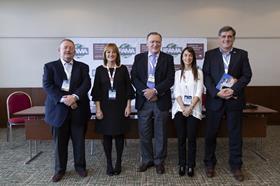
Argentina’s agricultural sector is dominated by highly educated, risk-taking young people who are open to innovation and new technology and have a positive outlook on the future.
These are the results of a survey carried out by the Agribusiness and Food Centre of the Austral University and the International Association of Food and Agricultural Management Agribusiness (IFAMA), which were presented at the 28th World Conference on Food and Agribusiness Management IFAMA in Buenos Aires in June.
The conference brought together more than 100 national and international leaders from the agri-food sector to discuss the challenges of food production to 2050.
Francesco Braga, CEO of IFAMA, said Argentina had been chosen as the venue for the event because of the high degree of innovation shown by local companies.
“Argentina has to develop its maximum potential and be one of the four largest food producers in the world,” Braga said.
IFAMA’s international president, Héctor Laurence, said: 'The strategic vision of IFAMA for the next three years has one central objective: to ensure there is enough quality, accessible and sustainably-grown food to meet the demands of the population, which is projected to reach 10bn by the year 2050.'
Regarding the challenges that Argentina has in terms of agribusiness management and food production for the coming years, he said: 'Working for the development of agribusiness, which makes up approximately 40 per cent of Argentina's GDP, is very important for the creation of employment, social inclusion and the country's wealth.
“The growth of the sector will help the country to fulfill the role that is expected globally from it: to be one of the greatest food producers in the world. '
Presenting the results of the survey on the needs of the Argentine Agricultural Producer, Bernardo Piazzardi of the Agribusiness and Food Center of the Austral University said: 'the Argentine field is no longer the same as it was 20 years ago.
“The business model is changing towards a vertical integration model where alliances between companies will be essential. Those who make decisions within companies are younger and more educated than the generations that preceded them. And 70 per cent of respondents say they plan to make investments in the next five years.
“All these data are an interesting diagnosis, a valid starting point to start building the country we dream of.”
Ana Galiano, Dean of the Faculty of Business Sciences of the Austral University, called for the creation of a forum made up of national and regional authorities and the private sector to “develop strategic and long-term public policies that help turn the country into the true supermarket of the world '.



